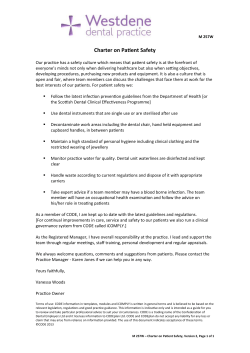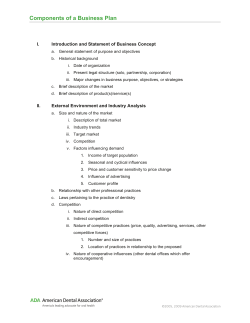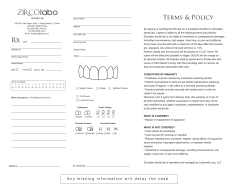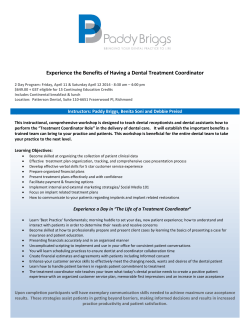
What is the Role of Clinical Expertise in Dental
What is the Role of Clinical Expertise in Dental Education? Gene C. Stevenson, D.D.S., M.S., M.P.H. The University of Texas School of Dentistry, Houston, Texas, USA and University of Oxford, Oxford, UK Background In dental education, clinical expertise serves an essential role in Evidence-Based Dentistry (EBD) because in order to become successful clinicians, dentists need to acquire competency in clinical skills in a variety of experiences. Expertise serves a vital function in dynamics of clinical dentistry not only by integrating therapeutic knowledge and surgical skills to identify and solve clinical problems, but also by integrating the evidence with the patient in the decision-making process. A dental student’s ability to develop clinical expertise is the key to becoming a successful clinician. Therefore, it is imperative to clearly define clinical expertise and its role in dental education. Although the term is used pervasively in defining EBD, the dental literature is fundamentally devoid of any distinct definition. Sackett (1996) Mulrow et al. (1997) American Dental Association (2001) Forrest (2001) Haynes et al. (2002) Howick (2011) Proposed Dental Expertise Model The new model consists of three core elements and three subsets: Core Elements Surgical Skills – ability to competently perform a variety of clinical procedures on hard and soft tissues in the oral environment Professional Decorum & Ethics – ability to apply a wide range of traits of professionalism, including personal demeanor (chairside manners), communication skills, cultural sensitivity, capability to interact successfully with patients of all ages, and integrity Therapeutic Knowledge & Critical Thinking – ability to competently apply knowledge, problem solving, and judgment (critical thinking) in diagnosis, decision-making, and development of treatment plans Subsets Identification of Treatment Options – possessing good knowledge of clinical procedures and various appropriate treatment options Patient’s Assurance & Acceptance – possessing good knowledge of clinical procedures and effective communication skills Patient Education & Informed Consent – possessing good knowledge of various appropriate treatment options and effective communication skills The primary goal in dental education is the development of a student’s clinical experience and to prepare the student to become an authoritative and independent clinician. Deficiency in any of the core elements or subsets in the Dental Expertise Model would result in clinical impairment which would compromise the student’s ability to provide optimal patient care. Optimal Patient Care Surgical Skills Patient’s Assurance & Acceptance Identification of Treatment Options Therapeutic Knowledge & Critical Thinking Professional Decorum & Ethics Patient Education & Informed Consent Conclusion PROPOSED DENTAL EXPERTISE MODEL Clinical expertise embodies the clinician’s experience and judgment which is entirely within the clinician’s discretion. The proposed Dental Expertise Model is not complex; no new material or theories have been incorporated into it. Existing dental topics and concepts have been reorganized into a very logical and cohesive manner. This new model clearly defines clinical expertise in EBD as being prescriptive, patient-centered and dynamic. It integrates the knowledge of the biological sciences, the development of preclinical skills, and the development of clinical skills to diagnose and manage oral disease and conditions. The model can be easily incorporated into dental education curricula and EBD clinical practice.
© Copyright 2025









